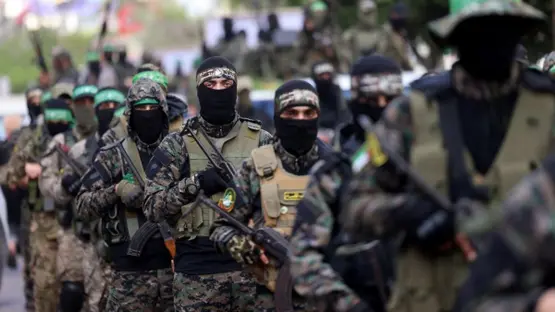Israel Demands Hamas’ Complete Disarmament as Negotiations Enter New Phase
By Kardo Roj
DAMASCUS, Syria (North Press) – Israeli Foreign Minister Gideon Sa’ar renewed calls on Tuesday for the full disarmament of Hamas and its withdrawal from political control in Gaza, setting the stage for heightened tensions as negotiations enter a critical phase. Hamas immediately rejected the demand, calling it a “red line” that it will not cross.
The international community has been closely watching the ongoing talks between Israel and Hamas, which have now reached a second phase focusing on hostage exchanges and potential reconstruction efforts in the besieged enclave. However, Israel’s insistence on Hamas’ disarmament introduces a new obstacle to the process.
Hamas spokesperson Sami Abu Zuhri made it clear that the movement would not negotiate away its weapons, stating, “Our arms are non-negotiable, and we will not accept any conditions that compromise the resistance.” He also rejected any attempts to displace the people of Gaza, amid speculation that Israeli plans for reconstruction may involve population transfers.
Meanwhile, Sa’ar emphasized that disarmament is a fundamental requirement for any lasting agreement. “This is not up for debate. If Hamas refuses, we have other means of ensuring security,” he warned, implying that military action could resume if negotiations fail.
The current phase of talks aims to facilitate a large-scale prisoner exchange between Israel and Hamas. While the first phase resulted in the release of several Israeli hostages in exchange for Palestinian detainees, progress has been slow. Hamas accuses Israel of deliberately stalling on humanitarian relief and reconstruction agreements, while Israel insists that security concerns must be addressed first.
Reports suggest that indirect talks, mediated by Qatar and Egypt, are struggling to make headway due to the growing gap between both sides. The U.S. and European nations have also pushed for a balanced approach, urging Israel to allow humanitarian aid into Gaza while pressuring Hamas to make concessions on security.
The blockade on Gaza remains in effect, with severe restrictions on goods, fuel, and medical supplies. Aid organizations warn that without a clear path to reconstruction, the humanitarian crisis could worsen.
As negotiations continue with no clear resolution in sight, the possibility of renewed military escalation remains high. Both Israel and Hamas have made it clear that they are unwilling to

